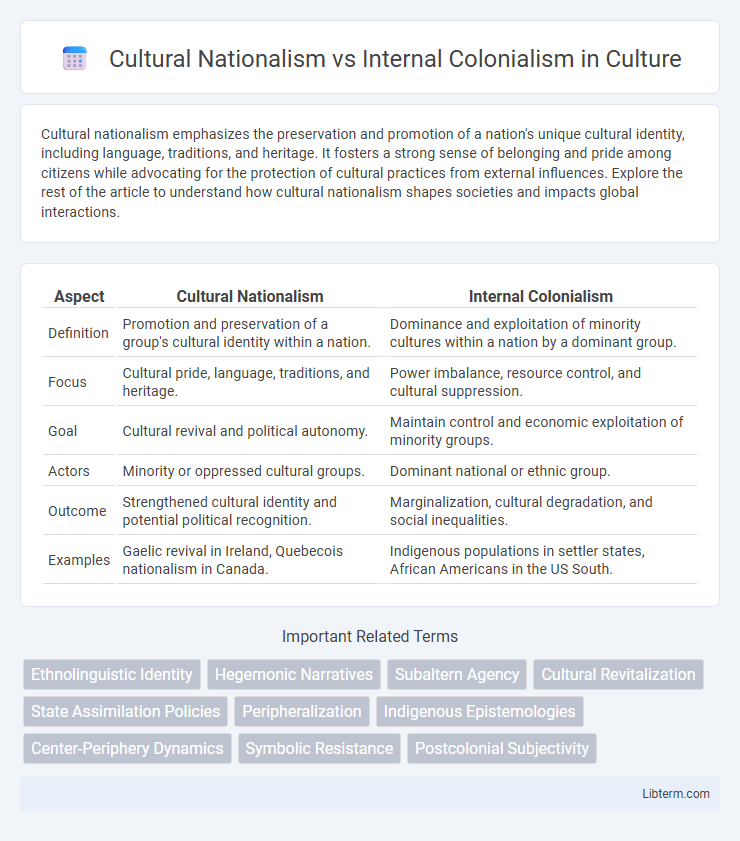Cultural nationalism emphasizes the preservation and promotion of a nation's unique cultural identity, including language, traditions, and heritage. It fosters a strong sense of belonging and pride among citizens while advocating for the protection of cultural practices from external influences. Explore the rest of the article to understand how cultural nationalism shapes societies and impacts global interactions.
Table of Comparison
| Aspect | Cultural Nationalism | Internal Colonialism |
|---|---|---|
| Definition | Promotion and preservation of a group's cultural identity within a nation. | Dominance and exploitation of minority cultures within a nation by a dominant group. |
| Focus | Cultural pride, language, traditions, and heritage. | Power imbalance, resource control, and cultural suppression. |
| Goal | Cultural revival and political autonomy. | Maintain control and economic exploitation of minority groups. |
| Actors | Minority or oppressed cultural groups. | Dominant national or ethnic group. |
| Outcome | Strengthened cultural identity and potential political recognition. | Marginalization, cultural degradation, and social inequalities. |
| Examples | Gaelic revival in Ireland, Quebecois nationalism in Canada. | Indigenous populations in settler states, African Americans in the US South. |
Defining Cultural Nationalism
Cultural nationalism emphasizes the promotion and preservation of a nation's distinct cultural identity, language, traditions, and heritage as central pillars of national unity and political sovereignty. It asserts that a shared cultural experience is fundamental to the legitimacy and cohesion of a nation-state. This approach contrasts sharply with internal colonialism, which involves the domination of minority groups within a country by a dominant ethnic or cultural majority, often resulting in cultural suppression and socio-economic disparities.
Understanding Internal Colonialism
Internal colonialism refers to the systemic uneven development and exploitation within a nation, where dominant groups impose economic, political, and cultural control over marginalized regions or ethnic groups. Unlike cultural nationalism, which emphasizes the preservation and promotion of unique cultural identities to foster unity and autonomy, internal colonialism highlights structural inequalities and subjugation embedded in national frameworks. Understanding internal colonialism involves analyzing power dynamics, resource distribution, and institutional discrimination that perpetuate internal divisions and inhibit equitable development.
Historical Roots of Both Concepts
Cultural nationalism originated in the 19th century as a response to imperial domination, emphasizing the preservation and revival of a distinct national identity through language, traditions, and cultural heritage. Internal colonialism, a concept developed in the mid-20th century, describes systemic economic and political disparities imposed by a dominant group within a nation on minority populations, often linked to historical processes of colonization and segregation. Both concepts arise from historical struggles against oppression and the quest for autonomy, reflecting different dimensions of identity and power in post-colonial and multinational states.
Key Differences Between Cultural Nationalism and Internal Colonialism
Cultural nationalism emphasizes the preservation and promotion of a group's distinct cultural identity, language, and traditions as a form of resistance against external domination, often seeking autonomy or independence. Internal colonialism refers to the systematic exploitation and marginalization of a minority or indigenous population within a country, where dominant groups control economic, political, and social resources, leading to structural inequalities. The key difference lies in cultural nationalism's focus on cultural revival and self-expression, while internal colonialism highlights power dynamics and socio-economic oppression within the same state.
Case Studies: Cultural Nationalism in Practice
Cultural Nationalism manifests in case studies like the Irish Gaelic Revival, where language and traditions were revitalized to assert national identity against British rule. The Quebecois movement similarly emphasizes French language preservation and cultural pride to resist assimilation within Canada. These examples highlight how cultural nationalism functions as a tool for reclaiming identity and contesting internal colonial structures through cultural revival efforts.
Case Studies: Manifestations of Internal Colonialism
Internal colonialism manifests through economic exploitation, cultural suppression, and political marginalization within a nation, as seen in the treatment of Indigenous peoples in Canada where resource control and cultural erosion are prevalent. The cultural nationalism movement among the Maori in New Zealand highlights resistance against internal colonial frameworks by reclaiming language, traditions, and political autonomy. Similar patterns appear in the Basque Country, where cultural revival efforts confront the Spanish state's centralizing policies, illustrating the tension between internal colonialism and cultural nationalism.
Impacts on Minority Groups and Identities
Cultural nationalism often seeks to preserve and valorize a dominant group's heritage, which can marginalize minority groups by imposing homogenized national identities and suppressing linguistic or cultural diversity. Internal colonialism exacerbates social inequalities by structurally subordinating minority populations through economic exploitation, political disenfranchisement, and cultural dominance within a single nation-state. Both frameworks significantly impact minority identities by limiting self-determination and reinforcing systemic barriers to cultural expression and political representation.
Role of Language and Education
Cultural nationalism emphasizes the preservation and promotion of a native language and indigenous education systems to reinforce national identity and resist external domination. Internal colonialism often imposes the dominant group's language and educational framework on subjugated populations, leading to cultural alienation and systemic inequality. The role of language and education in these contexts is pivotal, as they serve either as tools of empowerment for cultural revival or mechanisms of control and assimilation.
Political and Social Consequences
Cultural nationalism asserts the importance of preserving a group's identity against assimilation, often leading to movements for political autonomy and cultural revival that reshape national policies. Internal colonialism describes systemic inequalities within a state, where marginalized regions or groups face economic exploitation and social exclusion, fueling tensions and demands for redistribution or independence. Both frameworks influence social cohesion and political structures by challenging central authority and prompting debates on sovereignty, representation, and cultural rights.
Toward Reconciliation or Continued Conflict?
Cultural nationalism emphasizes preserving and revitalizing indigenous traditions and languages as a path toward reconciliation with dominant societies. Internal colonialism highlights systemic inequalities and exploitation within a nation's borders, often leading to continued conflict without structural change. Addressing both frameworks requires recognizing cultural rights alongside economic and political justice to foster genuine reconciliation.
Cultural Nationalism Infographic

 libterm.com
libterm.com